#Female + Non-Binary Filmmakers
Explore tagged Tumblr posts
Text

“Doctor Who” star Jodie Whittaker will lead a short film fund aimed at championing female and non-binary filmmakers.
The Empower fund, a community-led initiative backed by Primetime, a global vetted platform to help the industry find and hire more women above and below the line behind the camera, and Bournemouth Film School, was launched at the Cannes film market. It aims to remove the barriers of access to finance and star power that restrict underrepresented filmmakers. The fund will focus on championing female and non-binary filmmakers and grant them access to a minimum of a £10,000 ($12,430) grant in addition to other perks.
Whittaker will feature in or voice the final film, with the intention of increasing the visibility of the project and the filmmaker selected. The actor will also collaborate to create a prompt for filmmakers as a starting point for a character or story she would like to explore. There will be a focus on accessibility and reaching filmmakers who might not traditionally put themselves forward for grant funding. A brief will then be distributed and U.K.-based female and non-binary filmmakers will be encouraged to submit their short film project for consideration. Five projects will be shortlisted via an industry jury, and from that Whittaker will select the live action or animation film she would like to take part in or voice.
The fund will be accessible for any female or non-binary filmmaker who has directed at least three short films, one of which must have screened at a BAFTA or Academy qualifying film festival. The teams applying for funding must adhere to BFI diversity standards in order be considered.
Primetime was launched by actor Victoria Emslie (“Downton Abbey”) at Cannes in 2019 and the platform was relaunched earlier this year. It has members in some 70 countries, including multi-BAFTA, Emmy and Academy Award winners and nominees. Bournemouth Film School, at Arts University Bournemouth, has partnered with Primetime as part of its Funding Futures platform, which houses several funding schemes to support filmmakers, creatives, artists and innovators.
Whittaker said: “Being a part of this exciting journey and having the opportunity to work with talented new voices and creatives is an absolute joy. I can’t wait to work alongside Victoria and the amazing teams at Primetime and Funding Futures.”
Emslie added: “Community-driven change is one of the single most powerful and actionable ways to shake up traditional funding pipelines and the projects that receive finance. By paying in for each other with this focused intentionality, the rise to the top is navigated together as a collective.”
Jonathan Carr, director of the Bournemouth Film School, said: “The success of our groundbreaking Funding Futures schemes hinges on the strength of our partnerships. Our key focus is to encourage positive change within a sustainable industry. We’re delighted to play a pivotal role with Primetime to create a funding opportunity to truly champion inclusivity.”
Will Shutt from Funding Futures said: “The Empower fund hopes to create a space to make a film with filmmakers that reflects the core values of Primetime’s mission. I’m excited to see the outcome of connecting talented filmmakers with Jodie and the award. It can only lead to something special.”
Bournemouth Film School is hosting a Funding Futures showcase event at BFI Southbank on June 16 to unveil the Empower fund.
80 notes
·
View notes
Text

Introducing Canary:
In the midst of the Second World War, the newly graduated Grace Steele moves across the country to join the war effort in a munitions factory where she finds friends for life and a romances that seems too good to be true.
Follow here for updates on production, announcements and more!
Poster by Jacob Housego (@jacobhousego on Instagram)
1 note
·
View note
Text

Hi all! So even if I wasn't thrilled with Wish as a final product, I was really inspired by Brittney Lee's wonderful concept art for a more human-esque "Star"...so I decided to take that idea and put my own twist on it! Because as much as I like Brittney Lee's concept, I had two main thoughts in the back of my head while drawing this --
I actually liked that Star in the film wasn't explicitly male or female, and Disney hasn't ever done a non-binary main character in one of their animated films before, so I thought a more androgynous look could be interesting.
The original concept's hair makes him look A LOT like Jack Frost from Dreamwork's Rise of the Guardians, in my opinion -- and yes, although I like Jack, I don't see Star being much like him.
So -- thinking to salute the original idea of the filmmakers to take inspiration from past Disney projects -- I took visual inspiration from several characters, most from the Golden and Silver Age of Disney Animation (except for Puck from Disney's Gargoyles TV series, but come on, he's just fun), so as to play up the mute, but still very extroverted, sweet, playful personality this character would have. Much like mute side characters from some of Disney's previous works like Dopey, Dumbo, and the Spring Sprite, you would never be in doubt about what Star is feeling (if nothing else than because like Tinker Bell, they're prone to change color like a mood ring 😂) -- but as a central character of a full feature film with a very close (possibly even romantic) bond with our heroine Asha, they would have the chance to express a wider range of feelings than their predecessors...not just through their animation, but also (I would add!) a score that captures their mercurial air and feelings as well as Fantasia blended its art seamlessly with famous classical pieces.
To close us out -- some of the instrumental pieces from previous Disney projects that served as a playlist for my image of Star while working on this! Because for me, music and Disney have always gone hand-in-hand, and honestly, a cohesive and powerful score outside of just the lyrical music numbers always makes a Disney film 150% better...and I think in Wish's case, it would've also been elevated, if its music had come together in conjunction with the instrumentals meant for each scene to create a more cohesive score.
On the Rooftop / What's a Kiss / Perturbed Pixie - Peter Pan Bundle of Joy - Inside Out The Nutcracker Suite - Fantasia To Be Free - Aladdin Magical House Cleaning / Blue or Pink - Sleeping Beauty Under the Stars - The Lion King The Crystal Chamber - Atlantis: The Lost Empire Main Title - Return to Neverland
Have a magical night, everyone! xoxo
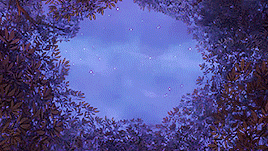
73 notes
·
View notes
Text
Trans/Love: Radical Sex, Love & Relationships Beyond the Gender Binary by Morty Diamond

Exploring the crossroads of gender and sexuality, Trans/Love: Radical Sex, Love & Relationships Beyond the Gender Binary offers unusually engaging narratives that create a raw and honest depiction of dating, sex, love, and relationships among members of the gender variant community. FTM, MTF, thirdgender, genderqueer, and other non-traditional identities beyond the gender binary of traditional male and female are included in this often heartwarming, occasionally heartbreaking, always heartfelt groundbreaking anthology. From monogamous love and marriage to anonymous sex and one-night hook-ups (and everything in between), these stories offer readers insight into the precarious emotional and practical mechanics of intimacy among gender-variant experiences.
Features contributions from award-winning authors including Julia Serano, Sassafras Lowery, and Max Valerio, alongside outstanding new writing by Tribe 8 guitarist and acclaimed film director Silas Howard, activist Joelle Ruby Ryan, filmmaker Ashley Altadonna, SisterSpit alum Cooper Lee Bombardier, and many other unique and talented voices.
#trans/love#trans/love: radical sex love & relationships beyond the gender binary#morty diamond#trans book of the day#trans books#queer books#bookblr#booklr
20 notes
·
View notes
Text
Angelina Jolie, Daniel Craig, Elton John, Andrew Garfield, Saoirse Ronan Titles Among BFI London Film Festival Full Lineup
The 68th BFI London Film Festival has unveiled its star-studded 2024 lineup, featuring Angelina Jolie, Elton John, Daniel Craig, Florence Pugh, Andrew Garfield, Saoirse Ronan, and more in a program boasting 39 world premieres and 12 international premieres among its 253 feature, short, series and immersive works.
The festival’s headline gala screenings will showcase a range of high-profile films. The world premiere of Steve McQueen’s “Blitz” starring Ronan opens the festival, while Morgan Neville’s “Piece by Piece” closes it.
International premieres include Roshan Sethi’s “A Nice Indian Boy” with Karan Soni and Jonathan Groff, Sadie Frost’s documentary “Twiggy,” Kimberly Reed’s “I’m Your Venus,” and Jane Mingay’s “Pauline Black: A 2-Tone Story.”
The festival, running from Oct. 9-20, will screen works from 79 countries in 63 languages, with 44% of the program made by female and non-binary filmmakers.
**
There will be screenings on 15 and 17 October.
15 notes
·
View notes
Text
“Doctor Who” star Jodie Whittaker will lead a short film fund aimed at championing female and non-binary filmmakers.
The Empower fund, a community-led initiative backed by Primetime, a global vetted platform to help the industry find and hire more women above and below the line behind the camera, and Bournemouth Film School, was launched at the Cannes film market. It aims to remove the barriers of access to finance and star power that restrict underrepresented filmmakers. The fund will focus on championing female and non-binary filmmakers and grant them access to a minimum of a £10,000 ($12,430) grant in addition to other perks.
56 notes
·
View notes
Text
A transwoman who tries to control women, spits on women and shouts at women are misgendering themselves.
A trans activist has reportedly been arrested and charged with assault after a vulgar confrontation at Edinburgh University in December. Robyn Woof, 35, spat on a woman who had been attempting to attend a screening of a documentary critical of gender ideology.
Woof, who was the Trans and Non-Binary Liberation Officer for the Edinburgh University Students Association, went viral in December after he was caught on film blocking a woman who was trying to enter the building to attend a screening of “Adult Human Female.” The documentary is critical of gender ideology’s impact on women, and the showing was hosted by Edinburgh Academics for Academic Freedom.
Multiple camera-phone videos of Woof began to circulate on December 14, including one where he explains to the crowd of attendees attempting to enter the building that he was an “adult human female.”

During the clash, Woof was caught on film spitting at a woman.
The event was ultimately cancelled due to safety concerns, and police were called to the scene. No arrests were made at the time, and Woof congratulated protesters on successfully having blocked the showing of the film in a statement on his Instagram page.
News of Woof’s arrest was announced by Wings Over Scotland on February 8, with the digest sharing an official statement from Police Scotland which read that a “woman” had been charged in connection to the alleged assault which took place at the screening.

In addition to his vocal trans activism, Woof is also a member of the University of Edinburgh’s rifle club. Many on social media speculated that a criminal charge will likely lose him his license to own a firearm.
Woof has a history of staging aggressive counter protests, particularly against women.
In 2019, he became violent towards a group of elderly women who were staging a silent anti-abortion protest across from a clinic. Mancunian Matters reported the incident, describing Woof as “a six-foot aggressor.”
The seniors, who were members of the groups 40 Days For Life, were targeted by Woof as they were praying. Woof stopped his car to confront the protestors, grabbing their chairs and throwing their posters while screaming “you people fucking disgust me.”

In wake of his new charges, Woof has launched a GoFundMe seeking donations for a new van. Titled “I’ve been targeted by transphobic extremists,” the fundraiser explains that he had complained to his university about the “transphobic film,” but the administration instead recommended that he attend the screening and debate his position.
According to to his fundraiser, Woof explained that he arrived at the first venue and due to protesters, they were moved to a new location but five protesters arrived first and blocked the door.
“Everyone went to the new venue and when I arrived in the corridor leading to the lecture theatre there were about 5 young protestors blocking a doorway,” Woof recounts in the description. He also denies assaulting anyone, despite the fact his hurling of saliva was caught on film. Women who attended the event have said his description of the incident is flawed.
Woof has stated he will be using the donations to buy a new caravan due to “death threats” he has received due to the allegations online of assault. Woof is allegedly intending to live in the caravan.
Adult Human Female, the documentary Woof and the other trans activists had disrupted, has been highly controversial since its release last year. The film was directed by Deirdre O’Neill, and focuses on the clash between gender ideology and women’s rights. Screenings across the UK have been met with protests and aggression from trans activists.
On the film’s official Twitter account, the filmmakers announced they have made a formal complaint to GoFundMe regarding Woof’s fundraiser.
By
Shay Woulahan
Shay is a writer and social media content creator for Reduxx. She is a proud lesbian activist and feminist who lives in Northern Ireland with her partner and their four-legged, fluffy friends.
#Edinburgh University#Robyn Woof is a man#Edinburgh University Students Association#Scotland#wings over scotland#Adult Human Female
47 notes
·
View notes
Text
Queer MTL Things to Do: March 2023
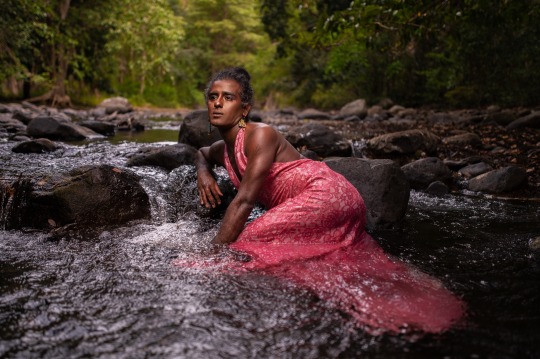
It takes more than a little snow and cold weather to keep Montréalers from enjoying the city’s neighbourhoods and events, and March is no different! Every month, Montréal’s queer calendar is stuffed full of exciting events, parties and performances. Here’s some of our picks for the best LGBTQ+ things to do in the city this month. For further announcements, follow QueerMTL on Instagram, Twitter, Facebook and Tumblr! Got an event coming up? DM it our way!
EVENT OF THE MONTH:
✨ The Visual Arts Centre McClure Gallery presents an all-new solo exhibition by multidisciplinary artist Kama La Mackerel titled Who sings the queer island body? from March 3 to 25, 2023, with a vernissage and artist-guided gallery tour on March 2, and an Art Hive gathering with La Mackerel on March 4.We highly recommend experiencing these works by one of Montréal’s most forward-thinking and celebrated queer artists up close and in person!
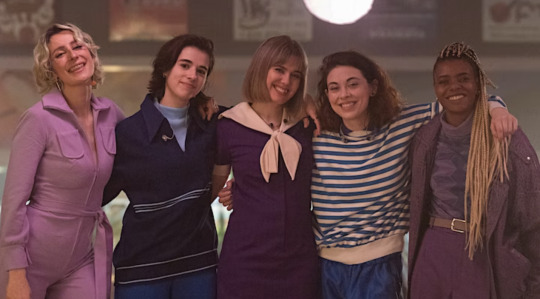
EVENTS
✍️ HommeHomo brings Drink & Draw back to Bar Le Cocktail on March 1, 2023, featuring live models and drink specials.
👠 Belen and Nora Vision host RESURGENCE—A Seance Produced Queer Cabaret on Wednesday, March 1, 2023, at the MainLine Theatre.
😆 In support of ASTEEQ, the Comedy Retakes! Fundraiser is at Le Frigo Vert on Thursday, March 2, 2023. Watch as panels of comedians brainstorm unmissable TV sitcom ideas live—and then vote on which ones you’d actually watch!
📚 The Violet Hour Book Club will meet and discuss the novel Tomboy Survival Guide by Ivan Coyote on Saturday, March 4, 2023 at the Archives gaies du Québec.
🤘The Cult of AnarchKey presents the Pop Punk Revival Dance Party + Pop-Up Drag Show on Saturday, March 4, 2023 at Turbo Haüs. Performers include Korra AnarchKey and mystery surprise guests.
🐦 Queer Birders meet at Parc Angringnon on Sunday, March 5, 2023. Find details and meeting point on Facebook.
😆 Better Than Your Therapist is both a comedy panel show and a dating mixer on March 5, 2023 at the Diving Bell Social Club—the perfect place to find someone with that GSOH you’ve been looking for. Tickets at the link.
😆 Live variety show How to Show Comedy? featuring queer and ally performers is at the Diving Bell Social Club on Tuesday, March 7, 2023.
🎥 As part of International Women’s Day on Wednesday, March 8, 2023, Georgette presents the premiere of the documentary TOUTES LES FXMMES with a special screening, Q&A and DJ set by Virginie B. Find information at Eventbrite.
📚Dr. Marika Cifor speaks on her book Viral Cultures: Activist Archiving in the Age of AIDS on Wednesday, March 8, 2023. Grab a ticket at Eventbrite.
🎥 Filmmakers and film industry professionals are invited to the bilingual Recontre de Cinéma Queer & Trans to mix and mingle, and perhaps find new collaborators at the MAI on Wednesday, March 8, 2023.
🏃🏾 The Rundraiser and Beer with the Qs on March 8, 2023 at Siboire, is raising funds to help support the first queer team’s participation in The Speed Project’s history—a 550 km relay race from Los Angeles to Las Vegas. The Qs (for Queer and Québec!) are the race’s first female/non-binary team identifying as queer!
🎥 Gold Factory presents Montréal Live Music & Movie Night for Gay / Alternative Women on Thursday, March 9, 2023 at Théâtre Sainte-Catherine, featuring a film screenings, music performances and a no holds barred sex talk.
👠 Some of Montréal’s top burlesque talent including Rosie Bourgeoisie, Miss Booty Jones and Sugar Vixen perform as part of Rock ’n’ Roll Babeland on Thursday, March 9, 2023 at the Wiggle Room.
👠 CLIMAX—un Queer Talent Show brings local burlesque, drag and other performers together for a night of queer expression at Bar Taboo on Friday, March 10, 2023.
👠 Miss Meow brings the Madonna Burlesque to Café Cleopatra on Saturday, March 11, 2023, featuring an all-star lineup of burlesque, drag and performers paying tribute to the Material Girl herself.
🎥 Le Frigo Vert hosts a screening of films made by QTBIPOC creators on March 11, 2023 at 6 PM.
👕 The Free Queer Clothes Swap returns to Champs Bar on Sunday, March 12, 2023, where “One trans’ trash is another trans’ treasure!”
🏳️🌈 French speakers gather for Causerie QUEER on March 15, 2023 at La Spère on the UdeM campus to discuss a variety of topics and network.
🧖 There’s a Kinky Queer Spa Day at Bota Bota on Friday, March 17, 2023.
🎥 The Le FIFA Film Festival presents the queer short film Purple City by Noam Gonick and Michael Walker at the Canadian Centre for Architecture on Saturday, March 18, 2023. The filmmakers will be in attendance!
😆 Sloan Kooshan draws on their queer, trans and Iranian identities in hosting SWANA Nowruz Comedy Special on March 19, 2023 at The Diving Bell Social Club featuring an all South West Asian North African comedy line-up.
🤭 Tales of Gender Affirmation, a night of comedy and storytelling returns for its 12th edition at The Diving Bell Social Club on Wednesday, March 22, 2023.
💅 Lust Cove, Montreal's only all QTBIPOC collective, returns with the sensual Baddies Do It Better on Friday, March 31, 2023 at Bar Notre-Dame-des-Quilles.
👠 Twice a month on every second Tuesday, Bring It! hosts an OTA night of ballroom and vogue with commentator and DJ. Follow their Instagram for dates and details.
🎤 Most Tuesdays, check out Stand Up St. Henri Open Mic at Impro Montréal, focusing on women, non-binary, queer and allied comedians.
🧘 Throughout certain dates in March, the Centre for Gender Advocacy presents the Queer Embodiment Experience at the Tiger Lotus Coop. Find details here.
🎤 Most Tuesdays, check out Stand Up St. Henri Open Mic at Impro Montréal, focusing on women, non-binary, queer and allied comedians.
🏒 Feminist hockey collective Hockey pour Poches meets every Thursday for games in Villeray’s Parc de Normanville.
💃 Tango/Salsa Queer’s continue, with Salsa Queer on Monday nights from 20:30-21:30 and Tango (beginners/intermediate) on Tuesdays at 19:00-20:30. Contact [email protected] for prices and location.
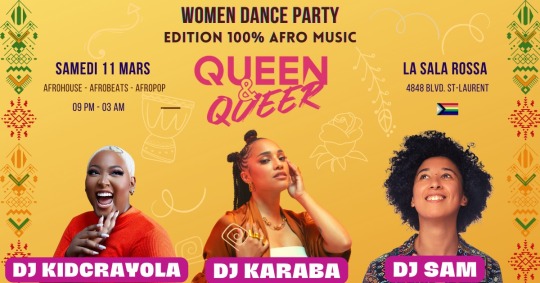
PARTIES
🥳 Homopop bring West End Gays, a house & disco dance party, to RIVERSIDE in St-Henri on Saturday, March 4, 2023. Gays and Disco=the perfect combination.
🥳 BABYLONE, an intimate house music event featuring only 250 spots, features some of Montréal’s hottest underground DJs on Saturday, March 4, 2023 at SansLux.
🥳 Queen & Queer presents their 100% Afro Music dance party Queen & Queer Vol. 9—Afro Edition on March 11, 2023 at La Sala Rossa.
🥳 HOMOPOP Dance Party, featuring everyone’s favourite queer bops, is back at Cabaret Berlin on Saturday, March 25, 2023.
🥳 K-Pop fans won’t want to miss Montréal KPOP Party #4 at Les Foufounes Électriques on Saturday, March 25, 2023. Dance to your favourite hits and catch some on-stage performances to boot.
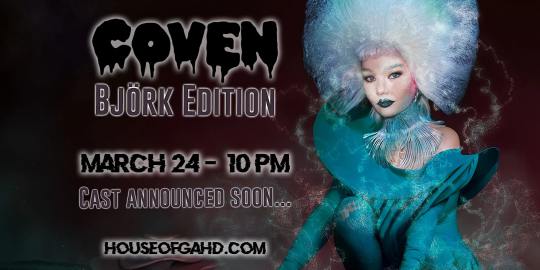
DRAG
👑 The queens of Cabaret Mado and special guest Lady Boom Boom celebrate the ‘80s with Girls Night Out on Thursday, March 2, 2023.
👑 Uma and Selma Gahd present Jackbox Games on Saturday, March 4, 2023. Popular with drag fans on Twitch during lockdown, it’s now live and in person at Bar Le Cocktail!
👑 While it may be cold outdoors, in Cabaret Mado the girls (including Kiara and Lady Boom Boom) are taking it to the beach with String Break! on Monday, March 6, 2023.
👑 Jimmy Moore brings his impeccable impersonation skills back to Cabaret Mado, this time in the guise of Lady Gaga. Thursday, March 9, 2023. Tickets here.
👑 Sasha Baga hosts Sashalicuious at Cabaret Mado on Thursday, March 16, 2023.
👑 Jimmy Moore brings his spot-on rendition of the Material Girl’s most infamous performance with MADONNA: The Blond Ambition Tour at Cabaret Mado on Saturday, March 18, 2023.
👑 Aizysse Baga presents TRASHILAZ, featuring members of Montréal’s groundbreaking underground drag scene on Thursday, March 23, 2023.
👑 House of Gahd brings COVEN: Björk Edition to The Diving Bell Social Club on Friday, March 24, 2023, with a ever-loving tribute to everyone’s favourite Icelandic diva.
👑 Uma Gahd hosts weekly screenings of RuPaul’s Drag Race Season 15 at Bar Le Cocktail in Montréal’s Gay Village on Friday nights. Come early for a ticket and laugh along all season!
👑 Every Monday at the Diving Bell Social Club, Bambi Dextrous hosts Trivia Mondays! Be sure to book your team table in advance.
👑 Every Tuesday, Canada’s Drag Race season 3 winner Gisèle Lullaby hosts Full Gisèle at Cabaret Mado. Tickets and schedule at Cabaret Mado’s website.
👑 On Friday and Saturday nights, the legendary Mado Lamotte hosts Mado Reçoit at her namesake club, Cabaret Mado. Each week, she shares the stage with a hand-picked roster of queens. Tickets and lineup info here.
👑 The amazing Tracy Trash hosts Le Tracy Show every Sunday at Cabaret Mado. Grab tickets here.
👑 Bar Le Cocktail’s regular weekly events include Vendredi Fou with Michel Dorion on Fridays, Samedi Drôles de Drags with a rotating cast of queens on Saturdays and Dimanche Show with Michel Dorion on Sundays. Check listings for specific details, and pick up tickets here.
#montreal#queermtl#mtlmoments#thingstodo#drag#dragqueen#parties#queer#lgbtq#2slgbtq#trans#gay#lesbian#events
5 notes
·
View notes
Text
Review: Seed of Chucky (2004)
Seed of Chucky (2004)
Rated R for strong horror violence/gore, sexual content and language

<Originally posted at https://kevinsreviewcatalogue.blogspot.com/2023/07/review-seed-of-chucky-2004.html>
Score: 2 out of 5
Seed of Chucky is, without a doubt, the most overtly comedic entry in the Child's Play franchise, specifically serving as writer and now director Don Mancini's take on a John Waters movie, right down to casting Waters himself as a sleazy paparazzo. It's a film full of one-liners, broad gags, gory kills that are often played as the punchlines to jokes, and most importantly, sexual humor, particularly in its depiction of its non-binary main character that is admittedly of its time in some ways but also a lot more well-intentioned than its peers, and holds up better than you might think for a movie made in 2004. This was really the point where Mancini being an openly gay man was no longer merely incidental to the series, but started to directly inform its central themes. In a movie as violent and mean-spirited as a slasher movie about killer dolls, this was the one thing it needed to handle tastefully, and it more or less pulled it off, elevating the film in such a manner that, for all its other faults, I couldn't bring myself to really dislike it.
Unfortunately, it's also a movie that I wished I liked more than I did. It's better than Child's Play 3, I'll give it that, but it's also a movie where you can tell that Mancini, who until this point had only written the films, was a first-time director who was still green around the ears in that position, and that he was far more interested in the doll characters than the human ones. The jokes tend to be hit-or-miss and rely too much on either shock value or self-aware meta humor, its satire of Hollywood was incredibly shallow and made me nostalgic for Scream 3, and most of the human cast was completely forgettable and one-note. Everything connected to the dolls, from the animatronic work to the voice acting to the kills, was top-notch, but they were islands of goodness surrounded by a painfully mediocre horror-comedy.
Set six years after Bride of Chucky, our protagonist is a doll named... well, they go by both "Glen" and "Glenda" (a shout-out to an Ed Wood camp classic) throughout the film and variously use male and female pronouns. I'm gonna go ahead and go with "Glen" and "they/them", since a big part of their arc concerns them figuring out their gender identity, and just as I've used gender-neutral pronouns in past reviews for situations where a character's gender identity is a twist (for instance, in movies where the villain's identity isn't revealed until the end), so too will I use them here. Anyway, we start the film with an English comedian using Glen as part of an "edgy" ventriloquist routine, fully aware that they're actually a living doll and abusing them backstage. When Glen, who knows nothing about where they came from except that they're Japanese (or at least have "Made in Japan" stamped on their wrist), sees a sneak preview on TV for the new horror film Chucky Goes Psycho, based on an urban legend surrounding a pair of dolls that was found around the scene of multiple murders, they think that Chucky and Tiffany are their parents, run off from their abusive owner, and hop on a flight to Hollywood to meet them. There, Glen discovers the Chucky and Tiffany animatronics used in the film and, by reading from the mysterious amulet they've always carried around, imbues the souls of Charles Lee Ray and Tiffany Valentine into them. Brought back to life, Chucky and Tiffany seek to claim human bodies, with Tiffany setting her eyes on the real Jennifer Tilly, who's starring in Chucky Goes Psycho, and Chucky setting his on the musician and aspiring filmmaker Redman, who's making a Biblical epic that Tilly wants the lead role in.
More than any prior film in the series, this is one in which the human characters are almost entirely peripheral. Chucky and Tiffany are credited as themselves on the poster, the latter above the actress who voices her, and they get the most screen time and development out of anybody by far, a job that Brad Dourif and Jennifer Tilly proved before that they can do and which they pull off once again here. Specifically, their plot, in addition to the usual quest to become human by transferring their souls into others' bodies, concerns their attempts to mold Glen/Glenda in their respective images. Chucky wants them to be his son, specifically one who's as ruthless a killer as he is, while Tiffany, who's trying not to kill anyone anymore (even if she... occasionally relapses), hopes to make them her perfect daughter. Their arguments over their child's gender identity are a proxy for the divide between them overall as people, building on a thread from Bride of Chucky implying that maybe theirs wasn't the true love it seemed at first glance but a toxic relationship that was never going to end well, especially since they never bothered to ask Glen what they thought about the matter. Glen is the closest thing the film has to a real hero, somebody who doesn't fit into the binary boxes that Chucky and Tiffany, both deeply flawed individuals in their own right, try to force them into, and series newcomer Billy Boyd did a great job keeping up with both Dourif and Tilly at conveying a very unusual character. Whenever the dolls are on screen, the film is on fire.
I found myself wishing the film could've just been entirely about them, because when it came to the humans, it absolutely dragged. As good as Tilly was as the voice of Tiffany, her live-action self here feels far more one-dimensional. We're told that she's a diva who mistreats her staff and sleeps with directors for parts, but this only comes through on screen in a few moments, as otherwise Tilly plays "Jennifer Tilly" as just too ditzy to come off as a real asshole. As for Redman, it's clear that he is not an actor by trade outside of making cameo appearances, as he absolutely flounders when he's asked to actually carry scenes as a sleazy filmmaker parody of himself. Supporting characters like Jennifer's beleaguered assistant Joan and her chauffeur Stan are completely wasted, there simply to pad the body count even when it's indicated (in Joan's case especially) that they were shaping up to be more important characters. There was barely any actual horror, to the point that it detracted from the dolls' menace. The satire of showbiz mostly amounts to cheap jabs at Julia Roberts, Britney Spears, and the casting couch, and barely connects to the main plot with the dolls, even though there was a wealth of ideas the filmmakers could've drawn on connecting Glen's quest to figure out their identity with the manner in which sexual minorities and other societal outcasts have historically gravitated to the arts. This was a movie that could've taken place anywhere, with any set of main human characters, and it wouldn't have changed a single important thing about it, such was how they faded into the background. At least the kills were fun, creative, and bloody, including everything from razor-wire decapitations to people's faces getting melted off with both acid and fire, and the fact that I didn't care about the characters made it easier to just appreciate the special effects work and the quality of the doll animatronics.
The Bottom Line
Seed of Chucky is half of a good movie and half of a very forgettable one, and one that I can only recommend to diehard Chucky fans and fans of queer horror, in both cases for the stuff involving the dolls. It's not the worst Chucky movie, but it's not particularly good either.
#seed of chucky#chucky#2004#2004 movies#horror#horror comedy#comedy#horror movies#comedy movies#slasher#slasher movies#supernatural horror#queer horror#brad dourif#jennifer tilly#billy boyd#hannah spearritt#don mancini#john waters#redman
2 notes
·
View notes
Text
Analytical Application 5
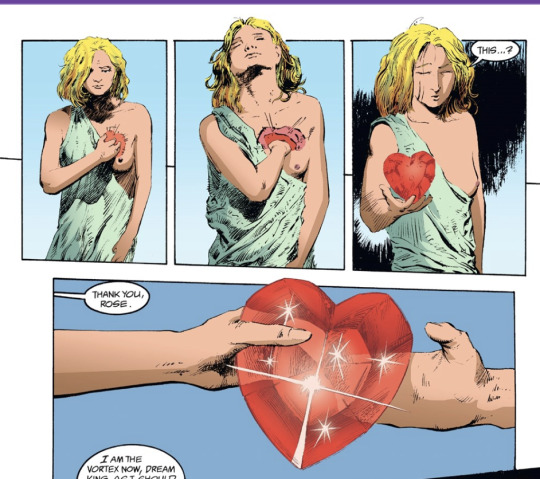
Scopophilia
For Mulvey, scopophilia is when pleasure is derived from looking at another person as a sexual object. In film, cinema satisfies this "primordial wish for pleasurable looking" (1) by presenting the human form as the object of the spectator's gaze. The scopophilic pleasure is mixed with narcissistic identification because the spectator projects their own ego ideal onto the image on the screen. Mulvey argues that this idea of scopophilia is central to the pleasure and power structures of mainstream narrative cinema. On page 429, the narrative unfolds within the realm of Dreams, where Rose finds herself having to give up her heart to her grandmother in order to thwart the vortex that threatens to unravel reality itself. As Rose reaches towards the physical embodiment of her heart, which is the very power of the vortex, the artist and reader chooses to make an artistic choice by illustrating an exposed breast across several panels, which only adds an unnecessary sexual element into the scene. This artistic decision encompasses Laura Mulvey's concept of scopophilia. According to Mulvey, the male gaze is often manifested through the objectification and sexualization of female characters, serving to satisfy the desires of the viewer. In this instance, the portrayal of Rose's vulnerability and the sexualized imagery within the Dream realm directly aligns with Mulvey's theories. It reflects a pattern wherein creators consistently sexualize Rose, presenting her in ways that cater to the presumed desires of the audience. What adds a layer of irony to this portrayal is its occurrence within the realm of Dreams itself. Within this realm, creators have unparalleled freedom to explore and manifest their subconscious desires. Thus, the sexualization of Rose within this space mirrors not only the desires of the creators but also their fantasies and projections about women. The Dream realm becomes a reflection of the creators' own dreams and the fulfillment of their desires, further reinforcing Mulvey's observations about the objectification of female characters within media.
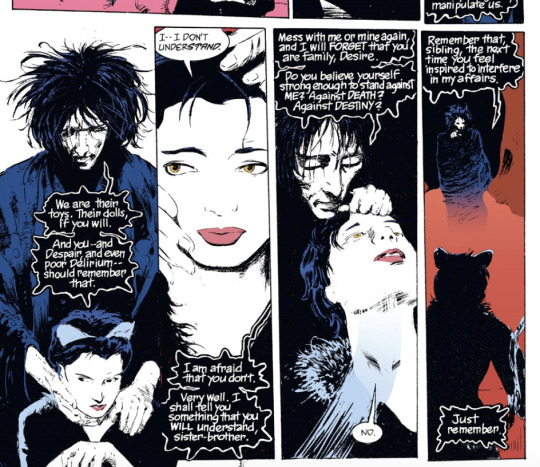
Queer Gaze Judith Butler idea of the concept of the ‘queer gaze’ is that the camera and filmmaker's gaze in a film can be seen as "an instrument and effect of lesbian desire", which "trades on the masculine privilege of the disembodied gaze, the gaze that has the power to produce bodies, but which is itself no body". (2) She argues that this gaze provides a perspective that challenges heteronormative conventions and offers alternative ways of seeing and interpreting visual representations, particularly in relation to gender and sexuality, and overall underscores how the queer gaze can subvert hegemonic norms of gender, race, and sexuality. In The Sandman on page 438, a confrontation unfolds between Dream and Desire, delving into the Desire’s ominous schemes to mess with Dream’s affairs and issue a vortex. Desire is depicted as a captivating, nonbinary entity, with feline allure throughout their interactions with Dream. What's interesting about Desire's portrayal is its fresh representation of nonbinary identity. Rather than reducing Desire to a mere stereotype or making their nonbinary identity the sole focus, the narrative presents them as a multifaceted character wielding significant power. We see them as an extremely desirable and sensual character, especially as the literal embodiment of the concept of Desire itself. Having Desire be non-binary/genderfluid encompasses the idea that Desire is amongst everyone, and takes on whatever form it pleases. It also imbues real life non-binary people with a powerful representation of a character, providing a new perspective and subverting typical hegemonic norms of gender and sexuality. This approach aligns with Judith Butler's concept of the queer gaze, which challenges conventional heteronormative norms, by portraying nonbinary individuals in the novel as desirable and authoritative without essentializing their identity. By showcasing Desire in this manner, "The Sandman'' offers a new perspective on how nonbinary people can be depicted in fiction. It recognizes their complexity and agency while avoiding tokenization or reducing them to their gender identity alone. Instead, Desire's character serves as a compelling embodiment of the fluidity and ambiguity inherent in nonbinary experiences, enriching the narrative with layers of intrigue and depth.
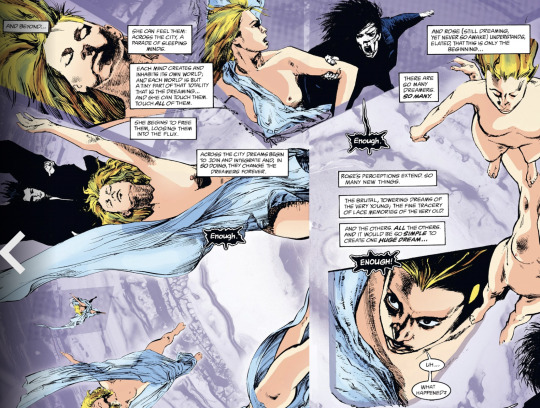
To-Be-Looked-At-Ness According to Mulvey, "to-be-looked-at-ness" refers to the way women are represented in cinema as passive objects of the male gaze and are coded for strong visual and erotic impact. Mulvey argues that "the determining male gaze projects its phantasy on to the female figure which is styled accordingly. In their traditional exhibitionist role women are simultaneously looked at and displayed, with their appearance coded for strong visual and erotic impact so that they can be said to connote to-be-looked-at-ness." (3) The objectification of the female form serves to satisfy the scopophilic desires of the male spectator while also denying women's subjectivity and agency within the narrative. In "The Sandman," Rose realizes her innate ability to influence and reshape dreams, and even alter reality itself. As she begins to unravel the fabric of dreams, her newfound power manifests visually, symbolized by her ethereal presence and the gradual shedding of her blue silk robe, revealing her naked form across successive panels on page 408. This sequence can be seen as not just merely a visual device but a complex interplay of symbolism and thematic exploration. While there is a metaphorical resonance between Rose's unraveling robe and the idea of her discovering her power over dreams, the explicit portrayal of her nakedness is questionable. The portrayal of Rose's naked body, fragmented across panels, implicates viewers in what Laura Mulvey terms "to-be-looked-at-ness," wherein the female character is objectified for the gaze of the spectator. Within the Dream realm, Rose is frequently subject to these naked portrayals and is constantly exposed. Despite her apparent power and status in the realm, it feels as if the artist disregards this and chooses to portray her in a vulnerable and erotic state for the pleasure of the viewer, particularly appealing to men. Rose's vulnerability and exposure serve as a visual metaphor for the scrutiny and objectification often imposed upon female characters in visual media. However, it's crucial to interpret this scene within the broader context of the narrative. Rose's unraveling signifies not just vulnerability but also agency and empowerment as she asserts control over the realm of dreams.
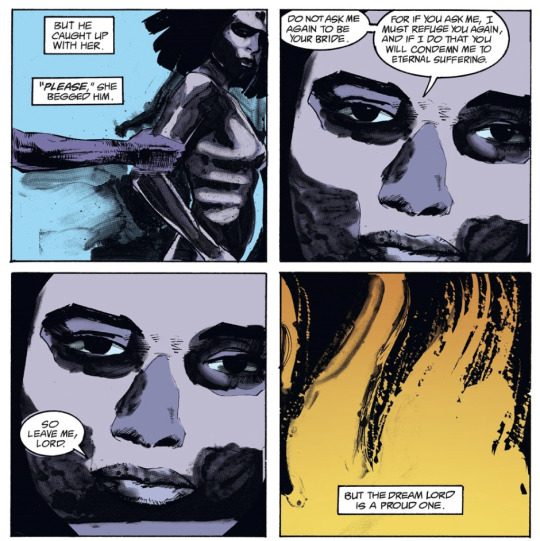
Phallocentric Spectatorship According to Mulvey, the concept of phallocentric spectatorship is the way mainstream cinema is structured around a male gaze that objectifies women as passive objects of visual pleasure. Mulvey argues that women are “bound by a symbolic order in which man can live out his phantasies and obsessions through linguistic command by imposing them on the silent image of woman still tied to her place as bearer of meaning, not maker of meaning” (4). This male gaze denies women's subjectivity and agency, positioning them as objects for the controlling, voyeuristic look of the male spectator. Mulvey sees this phallocentric structure of spectatorship as a key aspect of the patriarchal ideology that highlights how narratives and images often reinforce and uphold male dominance and authority. In the tale of Dream's first true love for Nada, the dynamics of power, agency, and gender roles intertwine in this short story. Dream's offer of companionship to Nada, as the Queen of dreams, initially appears as a gesture of affection and admiration. However, Nada, burdened by her own sense of unworthiness and the fear of her potential influence leading the world into darkness, refuses his proposition, and even jumps to her death. Despite Nada's rejection, Dream persists, repeatedly asking her to be his bride. In this persistent pursuit, Dream's dominance becomes evident, overshadowing any genuine choice for Nada, particularly as a woman in a primitive, patriarchal society. Dream's perception of Nada primarily as a bride and a potential Queen underscores the imbalance of power in their relationship, where his desires and perceptions take precedence over her individual autonomy. The panels on page 248 show the true nature of this dilemma, as Nada confronts the weight of eternal damnation should she continue to refuse Dream's advances. Her acknowledgment of the consequences underscores the coercive nature of Dream's affection, further accentuating the imbalance of power inherent in their dynamic. While she had the ability to recognize and accept her damned future when Dream asked again, Dream’s clear coercive nature makes the male dominance and authority evident within the panels. This narrative aligns with Mulvey's concept of phallocentric spectatorship, wherein the male gaze dominates and objectifies female characters, reducing them to objects of desire and reinforcing traditional gender roles. Nada's agency is subverted by Dream's relentless pursuit, which shows the true influence of patriarchal norms within the narrative framework. Thus, while Dream's love for Nada seemed to be genuine, it was ultimately tainted by the unequal power dynamics and societal expectations that governed their interactions.
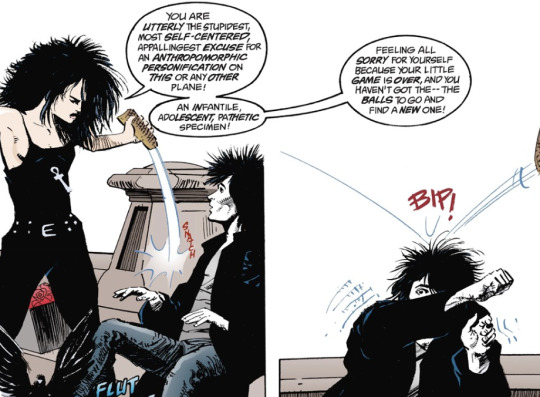
Subversion According to Mulvey, the concept of subversion in relation to the male gaze and female representation in film surrounds disrupting traditional patriarchal structures that objectify women on screen. Mulvey argues that "the paradox of phallocentrism in all its manifestations is that it depends on the image of the castrated woman to give order and meaning to its world". (5) By "destroying pleasure" and "destroying the satisfaction" derived from the voyeuristic and fetishistic gaze, women can challenge the dominant ideology that positions women as passive objects of the male spectator's desire. Mulvey's notion of subversion centers on destabilizing the normative visual pleasure associated with the cinematic apparatus and the male gaze. Death, depicted as the sister of Dream, exudes grace, spunk, and kindness, redefining the conventional perception of death on page 209. What really makes this significant is the fact that the portrayal of Death is a formidable female entity, diverging from the previous prevalent male personifications across cultures. Beyond her gender, she embodies traits of autonomy and personality, offering counsel and assistance to Dream amidst hard circumstances. This depiction aligns with Mulvey's notion of subversion, where established norms and expectations are challenged. Death's characterization challenges the traditional patriarchal dominance associated with the concept of death. Her presence not only defies gender stereotypes but also imbues death with a sense of compassion and understanding, contrasting with its typically feared and somber portrayal. By intertwining Death's character with agency and depth, the narrative subverts gender roles and offers a new perspective on mortality. Death's collaboration with Dream not only shows the importance of mutual support and cooperation, but we also see her knowing more and holding the role of an older, more powerful being, transcending traditional power dynamics. This portrayal resonates with Mulvey's idea of subversion, as it challenges established narratives and offers alternative interpretations that defy societal norms.
Citations Laura Mulvey, “Visual Pleasure and Narrative Cinema,” in Visual and Other Pleasures (Bloomington: Indiana University Press, 1989), 714. Judith Butler, “Gender is Burning: Questions of Appropriation and Subversion,” in Bodies That Matter: On the Discursive Limits of “Sex” (New York: Routledge, 2011), 347. Laura Mulvey, “Visual Pleasure and Narrative Cinema,” in Visual and Other Pleasures (Bloomington: Indiana University Press, 1989), 715. Laura Mulvey, “Visual Pleasure and Narrative Cinema,” in Visual and Other Pleasures (Bloomington: Indiana University Press, 1989), 712. Laura Mulvey, “Visual Pleasure and Narrative Cinema,” in Visual and Other Pleasures (Bloomington: Indiana University Press, 1989), 711.
0 notes
Text
0 notes
Text
0 notes
Text
Gripping thriller leads Mardi Gras Film Festival 2024 lineup
New Post has been published on https://qnews.com.au/mardi-gras-film-festival-2024-lineup/
Gripping thriller leads Mardi Gras Film Festival 2024 lineup
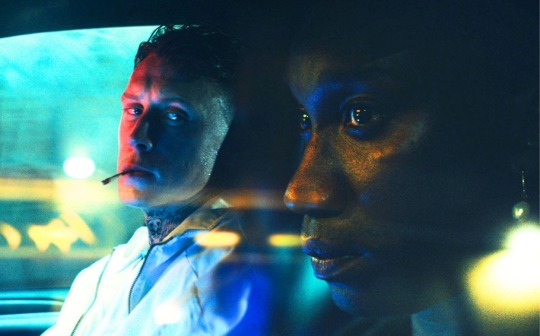
Queer Screen has unveiled the 31st Mardi Gras Film Festival’s full 2024 lineup of over 100 queer movies and shorts.
MGFF24 will come to cinemas across Sydney from February 15 to 29, with 161 films and events spread across unique programs.
National audiences can also stream films online on-demand from March 1 to 11.
The festival will open with the dark neo-noir thriller Femme, and close with Australian director Goran Stolevski’s chosen family drama Housekeeping for Beginners.
Festival director Lisa Rose said this year, the festival wants audiences to indulge in post-screening discussions and debate after watching the thought-provoking films.
“The theme focuses on films that start conversations. People will be keen to discuss and dissect them as soon as the credits start to roll,” she said.
“There’s so much to sink your teeth into, including several that will inspire lively debate.”
See all the films and book tickets at queerscreen.org.au and check out the highlights below.
Femme
The festival opens with the Sydney premiere of British neo-noir thriller Femme, a fierce psychodrama featuring phenomenal performances from Misfits star Nathan Stewart-Jarrett and George MacKay (Pride, 1917), about a drag star seeking revenge after a homophobic attack.
youtube
Housekeeping For Beginners
Australian filmmaker Goran Stolevski’s (Of An Age) delivers his signature fast-paced, witty dialogue in festival closer Housekeeping for Beginners. This sensitive, conversation-rich domestic drama finds joy in the chaos of found family.
youtube
Aristotle and Dante Discover the Secrets of the Universe
An evocative story of friendship and self-discovery between two teens in 1980s Texas, based on the critically acclaimed young adult novel.
youtube
All of Us Strangers
Paul Mescal and Andrew Scott reveal extraordinary intimacy in this beautiful, heart-wrenching film from director Andrew Haigh (Weekend).
youtube
Sunflower
Sunflower is an impressive first feature from director Gabriel Carrubba. Tender, atmospheric and touching, it follows Leo, a 17-year-old from working-class Melbourne who is questioning his sexuality.
youtube
A Portrait of Love
Documentary A Portrait of Love celebrates Archibald award-winning artist Craig Ruddy. Told through the eyes of his partner of twenty years, Roberto Meza, and directed by Molly Reynolds (My Name is Gulpilil), it’s an exuberant tale of creativity and devotion.
youtube
Sing-a-long: The Sound of Music
Calling all naughty nuns, cool captains and bratty kids! It’s time for The Sound of Music sing-a-long with the Order of Perpetual Indulgence.
youtube
Our Son
Boasting the power couple pairing of Billy Porter and Luke Evans, this is a sensitive, nuanced take on the breakdown of a long-term marriage.
youtube
Monica
Trace Lysette (Transparent) leads this lyrical tale of a trans woman called to care for the ailing mother (Patricia Clarkson) who disowned her.
youtube
Female Trouble
Glamour has never been more grotesque than in John Waters and Divine’s perverse classic Female Trouble, which celebrates its 50th anniversary.
youtube
Another Country
Celebrating its 40th anniversary, this gay classic features star-making (and swoon-worthy) performances from Rupert Everett and Colin Firth.
youtube
Happy Clothes: A Film About Patricia Field
What connects Sex and the City, The Devil Wears Prada and Emily in Paris? Fashion stylist extraordinaire and amazing lesbian Patricia Field.
youtube
Mutt
Non-binary heartthrob Lio Mehiel won a Special Jury prize at Sundance for their performance as trans man Feña in this raw, authentic drama.
youtube
Who’ll Stop the Rain
Evocative and romantic, this is the powerful story of two girls falling in love while protesting for creative freedom in post-martial law Taipei.
youtube
Along Came Love
In a sweeping love story spanning decades, a couple become one another’s saviours by hiding each other’s secrets in homophobic post-WWII France.
youtube
F.L.Y.
Two ex-boyfriends must live under one roof, putting their friendship (and some high heels) to the test, in this wistful comedy.
youtube
Girls Don’t Cry
Two teenage girls embark on a road trip through the Italian countryside. One is fleeing home, the other is desperate to return to her home in Romania.
youtube
I Am What I Am
A heartfelt anti-rom-com about an asexual woman grappling with the tension between her family’s expectations and her quest for independence.
youtube
The Mattachine Family
Nico Tortorella (Younger) and Emily Hampshire (Schitt’s Creek) star in this thought-provoking and funny look at chosen family.
youtube
Old Narcissus
This distinctly raw, erotically-charged drama delivers a powerfully melancholic portrait of ageing in Japan unlike anything seen before.
youtube
Tickets and passes for the 2024 Mardi Gras Film Festival are on sale now at queerscreen.org.au, with discounted tickets available to Queer Screen members.
For the latest LGBTIQA+ Sister Girl and Brother Boy news, entertainment, community stories in Australia, visit qnews.com.au. Check out our latest magazines or find us on Facebook, Twitter, Instagram and YouTube.
0 notes
Text
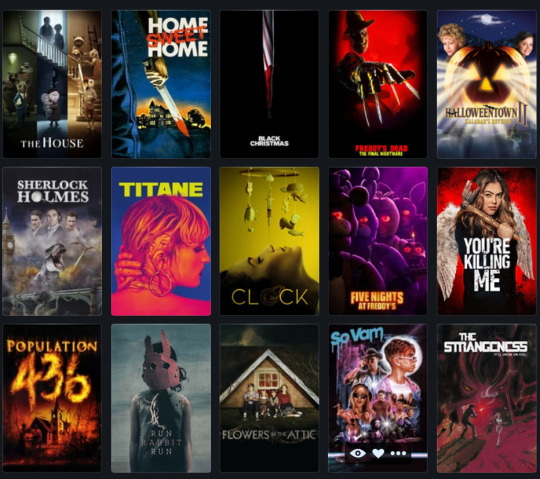

Hi, I'm Sarah.
Femtober was born 6 years ago as a means to challenge myself to be more aware of female directors and their space in horror on Letterboxd. In the years that have passed, women have carved a niche space in the genre and in film overall, but as I compiled my list this year in accordance to my rules (which - really are pretty abritrary. But if other list challenges have rules then why can’t I?), I realized that though women keep making films, there’s only so many rules that can be made surrounding films that land on Amazon, Hulu, Shudder, and repeat.
I feel like I’ve dipped far beyond the mainstream at this point, and my hope is that mainstream films (like Five Nights at Freddy's) will continue to follow, but the pace feels achingly slow. And while Letterboxd is a good resource for finding some of these films, there’s a distinct lack of interectionality that’s often hard to reconcile with. Perhaps I’m focused too much on identity in an already trangressive genre, but I don’t think I am.
When Femtober began, I was interested in watching films made by people like me, but the more films I watched, the more I realized how much we need films from all marginalized people to succeed. While Femtober is a somewhat binary project, there are so many filmmakers in the genre who are gender nonconforming that also have important things to say.
I guess all of this to say is, while Femtober is a project that is important to me (and really not to many others lol), I’m feeling a little discouraged by just how much of a male space the genre really is. So even if you’re doing some other list challenge this October, consider seeking out films from women and non-binary people. Consider broadening your horizons in a genre that’s meant to challenge you, even if your list doesn’t specify it.
♀♀♀
Well! That was a lot! Here are the rules: 1 Most popular female-directed horror on Letterboxd you haven't seen (Films ->Genre ->Horror) 1 Holiday-centric Film 1 Remake, Reboot, Prequel, or Midquel 2 Films from Centennial Studios 2 Films from non-AMPTP Studios 3 2023 Films 3 Films from Acclaimed Television Directors 3 Films from LGBTQIA+ directors 4 Films not in the English Language 5 Short Films 6 Decades
And of course, EVERY film MUST be directed by a woman. It’s entirely possible to complete your own list using none of the films listed here. Have fun and happy Femtober!
#femtober#femtober2023#femtober6#women in film#female directors#female directed films#women filmmakers#watch challenge#movies#film#horror#horror movies#fnaf#five nights at freddy's#saw#letterboxd
1 note
·
View note
Text
Week 1 - Alice Guy + Dell'asta
In Monica Dell'asta's, "What it Means to be Woman," the author writes about how the "normative binary opposition of 'male' and 'female' works to repress and restrain the individual's performance and expectations to a limited range of possibilities..." The male and female binary is exactly the sentiment being fought against in the films of Alice Guy-Blache, who aimed to challenge gender norms during her years in filmmaking. I specifically liked how "Madame's Cravings" spit in the face of idealized female politeness and restraint. By depicting a pregnant mother performing societally-unacceptable acts such as drinking and smoking, Guy-Blache actively challenged societal pressures to restrain female pleasure and expression. The film also challenges the depictions of men, as the cross dressing husband in the film is small and meek compared to his tall and assertive wife. He is the one chasing his wife around and not the other way around. He lacks agency while she possesses it. Like a lot of Guy's films, the reversal of roles reveals the absurdities that traditional roles actually entail. It's odd, humorous, and strange to see men be emasculated in such ways because we've become so accustomed to seeing them be depicted as strong, capable, and assertive, when there should be room to depict all types of men, women, and gender non-conforming individuals (and it should be normal/acceptable). Like Dell'asta, Guy-Blache sees the pitfalls of a strict male/female binary.
In our class discussion we also delved into how Dell'asta's thoughts on seriality pointed to individuals being a "series" of different identity aspects (religion, gender, sexual orientation, race, etc). Guy-Blache's films often address several of these topics at once. "Midwife to the Upper Classes," for example, depicts a couple consisting of a female-presenting individual and a crossdresser. The story hints at the couple not only being queer, but being racist as well as they want to adopt only the purist, non-black baby. Queer individuals, and women, can come in many forms. Guy doesn't aim to depict them in a morally-upstanding or idealized form, but to simply depict them.
1 note
·
View note